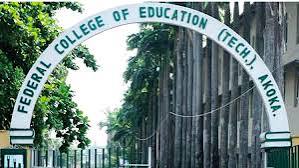The Federal College of Education (Technical) in Akoka, Lagos, became the center of controversy on Monday, July 29, as a protest against the institution’s leadership escalated into a confrontation with law enforcement. The incident has brought to light ongoing tensions within the college and raised questions about governance in Nigeria’s educational institutions.

Students and staff of FCE Akoka gathered to voice their opposition to the continued tenure of Dr. Wahab Azeez as the college’s provost. The protesters argue that Dr. Azeez’s stay in office violates the Act governing Federal Colleges across the country. However, the situation quickly deteriorated when police intervened, using tear gas to disperse the crowd.
The use of tear gas resulted in a chaotic scene, with students and staff scrambling for safety. This heavy-handed approach by law enforcement has drawn criticism from various quarters, with many questioning whether such force was necessary in an academic setting.
At the heart of the dispute is the interpretation of recent changes to the Federal Colleges of Education Act. Dr. Azeez, who was initially appointed in May 2019 for a four-year term, received a letter of reappointment for another four-year tenure in January 2023. However, the landscape shifted on June 12, 2023, when an amended Act came into effect, recommending a five-year single term for management officers in education colleges nationwide.
This legislative change has created confusion and disagreement over Dr. Azeez’s legitimate tenure. The provost maintains that his position is authorized and confirmed by the Federal Ministry of Education, citing the new law as justification. However, a group of unionists, calling themselves “Concerned Staff,” have challenged this interpretation, going so far as to lock the provost out of his office and issue a quit notice for his campus residence.
The situation at FCE Akoka reflects broader issues facing Nigeria’s education sector. Governance disputes, unclear regulatory frameworks, and tensions between administration and staff are not uncommon in the country’s higher education institutions. These challenges often impact the quality of education and the overall learning environment for students.
Moreover, the incident raises concerns about the use of force in managing disputes within academic settings. The deployment of tear gas against protesting students and staff may set a troubling precedent and could potentially escalate tensions rather than resolve them.
As the situation unfolds, there are calls for a peaceful resolution to the dispute. Education advocates stress the need for clear communication, adherence to established laws, and respect for due process in addressing leadership issues in academic institutions.
The events at FCE Akoka also highlight the importance of revisiting and clarifying educational policies to prevent similar conflicts in the future. Stakeholders argue that there should be unambiguous guidelines regarding the tenure of college leadership, leaving no room for conflicting interpretations.
As the dust settles on this incident, many are watching closely to see how the Federal Ministry of Education and other relevant authorities will respond. The resolution of this conflict could have implications not just for FCE Akoka, but for the governance of educational institutions across Nigeria.
In the meantime, students at FCE Akoka find themselves caught in the crossfire of an administrative dispute, raising questions about the impact on their education and well-being. As the academic community and wider public await further developments, the incident serves as a stark reminder of the challenges facing Nigeria’s education sector and the need for thoughtful, peaceful solutions to institutional conflicts.



